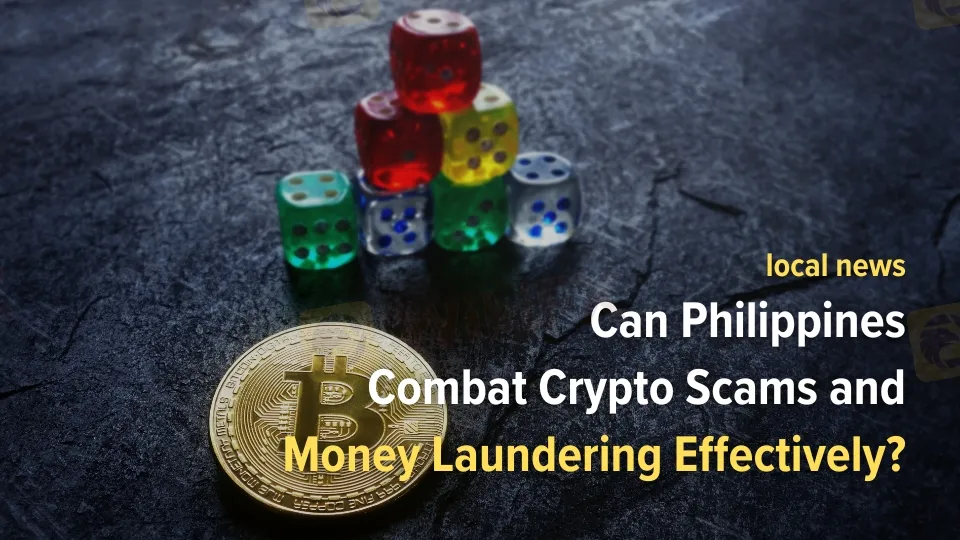简体中文
繁體中文
English
Pусский
日本語
ภาษาไทย
Tiếng Việt
Bahasa Indonesia
Español
हिन्दी
Filippiiniläinen
Français
Deutsch
Português
Türkçe
한국어
العربية
Can Philippines Combat Crypto Scams and Money Laundering Effectively?
Abstract:Can the Philippines effectively fight crypto scams as an instrument of money laundering and other illegal gambling? Discover the challenges, reforms, and efforts to exit the FATF gray list.

The Philippines' plan to outlaw internet casinos that cater to international gamblers is intended to combat money laundering, but experts warn that considerable hazards remain. According to Moody's analyst Choon Hong Chua, underground gambling and developing scam operations continue to undermine the country's efforts to strengthen its anti-money laundering reputation.
Issues with Illegal Operators and Organized Crimes
Despite President Ferdinand Marcos Jr.'s late 2024 prohibition, unauthorized operations have continued. Recent Bureau of Immigration searches discovered claimed fraud centers and illicit internet gambling operations and even crypto operations, demonstrating that organized crime remains profitable and tough to remove. Chua noted that criminal operations frequently adapt, making law enforcement a constant fight.

Philippines' Attempts to Get Off the FATF Gray List
The Financial Action Task Force (FATF) acknowledged the Philippines' efforts in addressing the issues that landed the nation on its grey list in June 2021.
- Reforms include mitigating hazards from casino junkets.
- Unregistered remittance operators are subject to sanctions.
- Money laundering and terrorist funding investigations and prosecutions will be strengthened.
Exiting the FATF gray list this year may lower remittance costs and boost economic activity, helping millions of overseas Filipino workers (OFWs) and their families.
Consistency in Anti-Money Laundering Enforcement
Chua emphasized the need for constant anti-money laundering efforts to preserve success. He emphasized that nations on the FATF radar had previously cycled in and out owing to uneven enforcement. While financial institutions are subject to strict regulation, corporations serving high-risk clientele remain susceptible.
“Across the world, corporate organizations are not as regulated as financial institutions,” says Chua. This gap emphasizes the importance of maintaining attention in combating money laundering concerns.
Final Thoughts
The Philippines has made progress in preventing money laundering through legislative measures and an online casino prohibition, but obstacles remain. Illegal operators and developing organized crime necessitate ongoing enforcement in order for the country to improve and be removed from the FATF gray list. Exiting the watchlist will provide huge economic benefits, but as Chua argues, perseverance is essential for preventing a relapse into heightened monitoring. The battle against money laundering must remain a top focus for the Philippines as it pursues long-term prosperity.

Disclaimer:
The views in this article only represent the author's personal views, and do not constitute investment advice on this platform. This platform does not guarantee the accuracy, completeness and timeliness of the information in the article, and will not be liable for any loss caused by the use of or reliance on the information in the article.
Read more

TriumphFX Rebrands to Continue Global Fraud: Over RM80 Million Lost
The notorious forex investment company TriumphFX, previously exposed for running a global scam operation for over a decade, is now being accused of rebranding itself to continue defrauding unsuspecting investors. Despite being unregulated and based offshore in Seychelles, TriumphFX has actively targeted Malaysian investors, luring them with false promises and eventually converting funds into cryptocurrency, making recovery nearly impossible.

Vantage Markets Review 2025: Trusted Forex and CFD Trading Since 2009
Explore our 2025 Vantage Markets review! A trusted Sydney-based broker since 2009, offering forex, CFDs, low spreads, global regulation, and 24/7 support. Trade from $50!

IronFX vs Exness Review 2025: Comprehensive Broker Comparison
Explore an in-depth comparison between IronFX and Exness. Compare licensing, features, regulation, trading platforms, and customer service for smarter trading decisions.

TriumphFX Faces 29 Exposure Reviews on WikiFX
TriumphFX faces scrutiny with 29 exposure reviews on WikiFX, revealing regulatory warnings from ID BAPPEBTI, VU VFSC, SG MAS, and MY SCM, plus user complaints about withdrawal issues and fraud concerns.
WikiFX Broker
Latest News
How much money will you earn by investing in Vantage Broker?
IronFX vs Exness Review 2025: Comprehensive Broker Comparison
Fraudsters Are Targeting Interactive Brokers' Users with Lookalike Emails
Everything you need to know about ADSS
SkyLine Guide 2025 Malaysia: 100 Esteemed Judges Successfully Assembled
Vantage Markets Review 2025: Trusted Forex and CFD Trading Since 2009
Top Tips to Choose the Best Forex Broker in 2025
SEBI Notifies New F&O Rules for Investors - New Derivative Trading Limits & More Amendments
Interactive Brokers: Global Office Visits and Licensing Details
U.S. Jobs Data Released: A Potential Boost for Gold Prices
Currency Calculator


